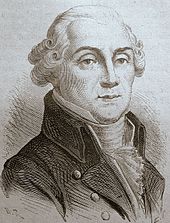Jean-Baptiste Treilhard
Jean-Baptiste Treilhard (born January 3, 1742 in Brive-la-Gaillarde , Département Corrèze , † December 1, 1810 in Paris ) was a politician during the French Revolution and from 1798 to 1799 member of the board of directors .
Life
Jean-Baptiste Treilhard was born the son of a lawyer. He took up his father's profession, found a job at the Parlement of Paris in 1761 and a few years later took over the post of inspector general of the crown property.
In the spring of 1789, the outstanding lawyer Treilhard from the Third Estate of the City of Paris was elected a member of the States General . He was a member of the Constitutional and Church Committee of the Constituent Assembly , where he voted for the unicameral system and for the king's right of veto "with suspensive effect for two legislative periods" . This veto right was confirmed on September 11, 1789 by 575 votes against 325 by the members of the Constituent Assembly.
In autumn 1789 Treilhard demanded that the church property be included. He obtained the resolution of the Constituent Assembly on February 13, 1790, to repeal and expropriate religious orders and congregations . Together with Armand-Gaston Camus and Henri-Baptiste Grégoire he worked out the civil constitution of the clergy, which was passed on July 12, 1790 by the majority of the MPs and on July 26, 1790 by Louis XVI. was made law. Treilhard, who rose to become an important politician in those days, took over the office of President of the Constituent Assembly from July 20 to 31, 1790.
Pope Pius VI refused to canonically sanction the civil constitution of the clergy. This led to heated public discussions. Another resolution, the main parts of which were drawn up by Treilhard and adopted by the Constituent Assembly on November 27, 1790, intensified the conflict with the Catholic Church. With immediate effect, all clergymen who held public office were required to take an oath of allegiance to the state, the constitution, the king and the law, and to recognize the civil constitution of the clergy. Two thirds of the clergymen refused to take these oaths and were therefore removed from their offices. The Pope then condemned the Constituent Assembly and the civil constitution in his briefs of March 10 and April 13, 1791. A little later the French clergy split into a Rome-loyal and a constitutional clergy.
After the Constituent Assembly was dissolved on September 30, 1791, Jean-Baptiste Treilhard stood before the criminal court of Paris. In September 1792, the Seine-et-Oise department elected him to the National Convention . He served as President of the National Convention from December 27, 1792 to January 10, 1793 and voted for the death of Louis XVI on January 17, 1793. Then he hurried to Belgium as a “representative in mission” . As a supporter of the political "level" , Treilhard was accepted into the welfare committee on April 6, 1793 , but left on June 13, 1793. He then went to the Dordogne and Gironde departments to suppress the unrest that had broken out among the disempowered Girondins . But on July 20, 1793, Treilhard had to cede his powers to Jean Lambert Tallien . He returned to Paris and remained politically in the background until the overthrow of 9th Thermidor II (July 27, 1794).
Jean-Baptiste Treilhard was accepted into the Council of Five Hundred by the National Convention in October 1795 , where he acted as President from December 22, 1795 to January 20, 1796 and represented France at the Rastatt Congress in 1797/98 . He was elected to the Board of Directors on May 15, 1798 in place of Nicolas-Louis François de Neufchâteau . However, as a result of the coup d'état on Prairial VII (June 18, 1799), his election was declared invalid for formal reasons. Thereupon Treilhard, who was one of the opponents of the royalists , but above all one of the enemies of the Neo-Jacobins and thus remained a Maraisard over the years , had to leave his place on the board of directors to Louis Jérôme Gohier .
From 1802, Jean-Baptiste Treilhard served as head of the appellate court of the Seine department . Napoleon I appointed him a State Councilor and a member of the Legion of Honor, and in 1808 elevated him to the rank of count. Treilhard played a key role in the reforms and legislation during the consulate and the First Empire . He died on December 1, 1810 in Paris.
literature
- Bernd Jeschonnek: Revolution in France 1789–1799. A lexicon. Akademie-Verlag, Berlin 1989, ISBN 3-05-000801-6 .
| personal data | |
|---|---|
| SURNAME | Treilhard, Jean-Baptiste |
| BRIEF DESCRIPTION | Politician during the French Revolution |
| DATE OF BIRTH | January 3, 1742 |
| PLACE OF BIRTH | Brive-la-Gaillarde , Corrèze department |
| DATE OF DEATH | December 1, 1810 |
| Place of death | Paris |
